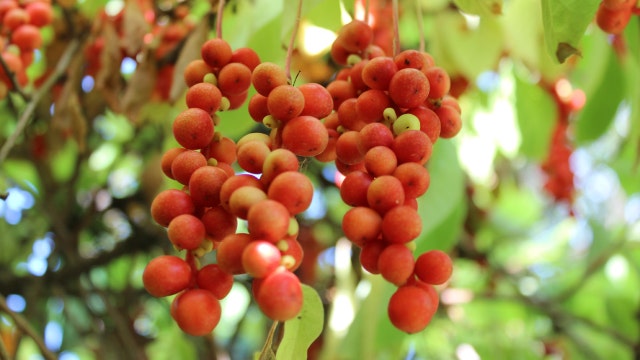Nature’s longevity secrets revealed
There have been some serious strides in the science behind living longer, and some come from nature. Dr. Manny talks with Medicine Hunter Chris Kilham about a few plants that can help you live longer
In the various healing traditions around the world, certain herbs are deemed longevity-enhancers by virtue of their numerous health benefits. This year I have four longevity herbs to watch and use, based on established and new science and breakthroughs over the past 2015 year.
Schizandra has been used extensively in Traditional Chinese Medicine for over 2,000 years. Schizandra is the berry of a climbing vine native to northeast China and parts of Russia. It is now also cultivated in the northeastern U.S. The berry is known as an adaptogen, and aids in energy, stamina, endurance. It is considered a valuable sex tonic, and demonstrates liver-protective properties.
New science published in 2015 showed that schizandra possesses anti-HIV properties, and may inhibit the replication of the virus. This does not mean that the berry and its preparations are HIV cures, but they may prove valuable in helping to control the disease.
Schizandra also now has been shown to help combatting inflammatory bowel disease. We have seen this same activity with elderberry and some other berries, and now schizandra. This anti-inflammatory activity is likely due to the deep red pigments in the berry.
Additional 2015 science showed that schizandra provides valuable protection to the kidneys, helps to inhibit some human lung cancers, and acts against chlamydia bacteria, an STD.
In the cosmetic world, additional science shows benefits for skin revitalization. Some of this is due to antioxidant protection, and some to the skin-renewing properties of the berry.
Schizandra is available mostly as a nutritional supplement.
Cranberry, the original North American berry, is primarily known as a condiment at Thanksgiving. But cranberry is also a potent aid in fighting UTIs – urinary tract infections.
New 2015 research on cranberry concentrated on improved urinary tract health among men and women, reduced UTIs, and reduced nighttime urination. For reasons that are not entirely understood, cranberry is of special value to the urinary tract. Much of this is due to the ability of the berry to prevent harmful bacteria from sticking to walls of the urinary tract. The capacity of cranberry to reduce UTIs was affirmed in various studies this past year. Its use for reducing frequency of nighttime urination is due to its ability to promote more thorough urination.
Further recent research shows additional protective properties of nutrients in cranberry against inflammation and oxidation, as well as enhanced protection against ovarian, esophageal and prostate cancers. Cranberry is clearly showing itself to be one of the great “superberries.”
Cranberry is available as a whole berry, in various sauces and preparations, as a juice, and as a nutritional supplement.
Cordyceps is a precious fungus typically harvested in the wild in the mountains of Asia, that has been employed medicinally for close to 3.000 years. Traditionally, it has been employed for its benefits to the heart and respiration, for its energy-boosting effects, and for anti-aging purposes. In human cardiovascular studies, use of cordyceps lowered serum triglycerides and cholesterol overall, and increased beneficial HDL levels.
Cordyceps enhances nutritional blood supply to the organs and extremities, specifically increasing blood supply to the brain and defending the heart against stress. The herb boosts respiration and the body’s use of oxygen, and helps to improve cases of chronic asthma and bronchitis. Cordyceps also possesses antioxidants which delay cellular destruction, and demonstrates anti-inflammatory activity. As if that weren’t enough, cordyceps further helps to protect the liver and kidneys against damage.
Analysis of cordyceps reveals natural substances, including cordycepin and adenosine, which boost immunity, increase stamina, and improve recovery from fatigue. Results of various studies show that cordyceps does in fact enhance performance.
Perhaps the biggest new breakthrough with cordyceps is that it can be successfully cultured in laboratories. This not only eliminates problems with contamination, but also enables producers to significantly concentrate the active principles of this remarkable health aid.
Cordyceps is available as a nutritional supplement.
Jiaogulan is a longevity tea employed for 3000 years in Asia. You may likely be unfamiliar with this herb, but that will change as its star rises in the West.
The tea is indigenous to the southern areas of China, southeast Asia and Japan. The leaf is used as a longevity tea and is rich in compounds of a type found in ginseng. Jiaogulan leaf is packed with powerful antioxidants and anti-inflammatory agents as well.Research shows numerous benefits from Jiaogulan. Regular use of the tea helps to lower cholesterol, control high blood pressure, and strengthen immune function.
Last year was a good year for jiaogulan research. Various studies found that the leaf possesses anti-prostate cancer activity. Research also supported the herb’s already well-known benefits for stress reduction.
Investigation into the anti-cancer properties of jiaogulan showed new activity against colorectal, lung and liver cancers. Additional research found new protection against DNA damage.
Jiaogulan is available as both a tea and a nutritional supplement.
Stay healthy!
